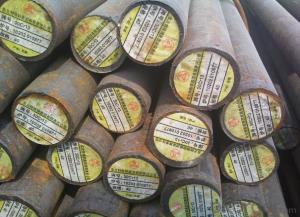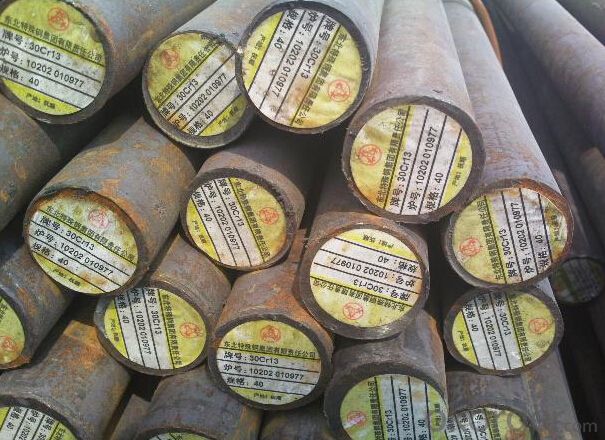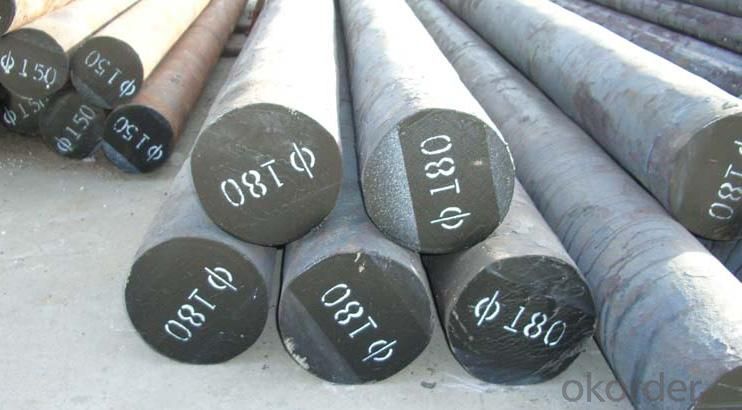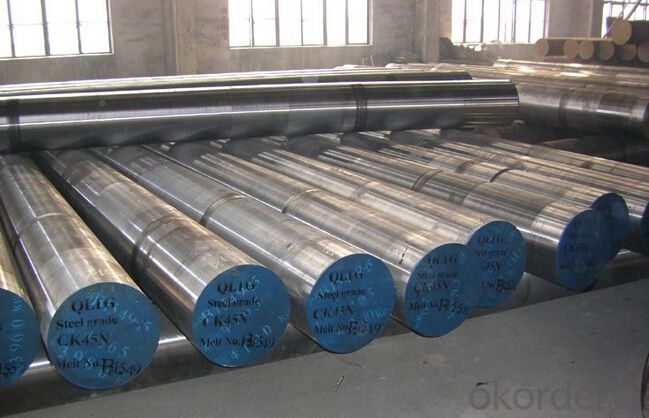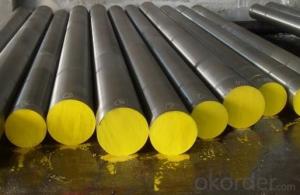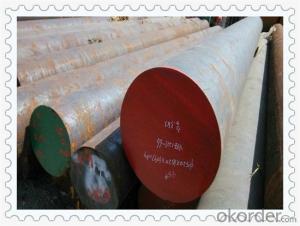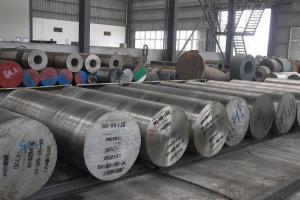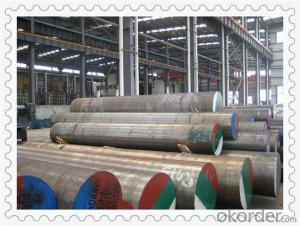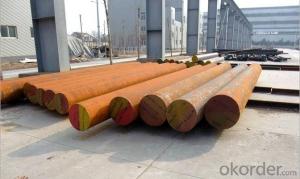Forged Steel Bar1.2343/X38CrMoV5-1 Steel Round Bar
- Loading Port:
- China main port
- Payment Terms:
- TT OR LC
- Min Order Qty:
- 300 m.t.
- Supply Capability:
- 10000 m.t./month
OKorder Service Pledge
OKorder Financial Service
You Might Also Like
Specification
Forged Steel Bar1.2343/X38CrMoV5-1 Steel Round Bar
Product Information:
Specifications tool steel
1.2343/X38CrMoV5-1 forged steel bar in Wuhan China
2.Hardness after annealing : Max. 204HB
Chemical Composition(%)
| Standard | C | Si | Mn | Cr | P≤ | S≤ | Mo | V |
| DIN | 0.36-0.42 | 0.90-1.20 | 0.30-0.50 | 4.80-5.80 | 0.03 | 0.03 | 1.10-1.40 | 0.25-0.50 |
| ASTM/ GB | 0.33-0.45 | 0.80-1.20 | 0.20-0.50 | 4.75-5.50 | 0.03 | 0.03 | 1.10-1.60 | 0.30-0.60 |
Size conditions:
| round | Diameter(mm) | Length(mm) | |
| 14~500 | 2000~6000 | ||
| Plate/sheet | Thickness(mm) | Width(mm) | Length(mm) |
| 15~500 | 50~600 | 2000~6000 |
Product Overviews:
| Product Name | Typical Grades | Diameter(mm) | Standard adopted |
| Carbon Steel | 20 (1020/S20C/C22) | Ø16-Ø300 | GB/SAE/JIS/DIN |
| 40 (1040/S40C/C40) | |||
| 45 (1045/S45C/C45) | |||
| Bearing Steel | GCr9 (51100/SUJ1) | Ø12-Ø250 | |
| GCr15 (52100/SUJ2/100Gr6) | |||
| GCr9SiMn (A485-Gr.1/SUJ3) | |||
| Cr-Mo Steel | 20Cr (5120/SCr420H/20Cr4) | Ø12-Ø250 | |
| 40Cr (5140/SCr440/41Cr4) | |||
| 42CrMo(4140/SCM440/42CrMo4) | |||
| Gear Steel | 20CrNiMo | Ø16-Ø600 | |
| 20CrMn(5115/SMnC420/20MnCr5) | |||
| 20CrNiMo(8620/SNCM220/20CrMiMo2) |
Product Show:

Our Advantages:
· Industry experience over 20 years.
· Shipment of goods -More than 70 countries worldwide.
· The most convenient transport and prompt delivery.
· Competitive price with best service.
· High technical production line with top quality products.
· High reputation based on best quality products.
With our experienced, enthusiastic and dynamic staffs, we assure to bring you the products with best quality, reasonable prices and good after-sales services under the motto: Friends First, Business After.
Communication, Experience, Expertise and Best efforts are our Promises to you.
- Q: What are the main advantages of using special steel in the medical field?
- The main advantages of using special steel in the medical field are its high strength and durability, corrosion resistance, and compatibility with sterilization processes. Special steel can withstand harsh conditions and repetitive use without compromising its integrity, making it ideal for medical devices and surgical instruments. Additionally, its resistance to corrosion ensures a longer lifespan and reduces the risk of contamination. The compatibility with sterilization methods, such as autoclaving, ensures that medical equipment remains safe and sterile for patient use.
- Q: How is special steel used in the chemical industry?
- Special steel is used in the chemical industry primarily for its corrosion resistance, high temperature stability, and durability. It is widely utilized in the construction of chemical processing equipment, such as reactors, tanks, and pipelines, to withstand harsh and corrosive environments. Additionally, special steel alloys are employed in the production of catalysts, which are essential for various chemical reactions. Overall, special steel plays a crucial role in ensuring the safety, efficiency, and longevity of chemical processes within the industry.
- Q: How does special steel contribute to reducing product failure?
- Special steel contributes to reducing product failure in several ways. Firstly, special steel is known for its superior strength and durability, which makes it less prone to breakage or deformation under stress. This ensures that products made with special steel can withstand heavy loads or harsh environments without failing. Additionally, special steel often has enhanced corrosion resistance properties, protecting products from rust or degradation over time. This helps to extend the lifespan of the product and reduce the chances of failure due to corrosion. Furthermore, special steel can be tailored to specific applications, allowing manufacturers to choose the right type of steel with the required characteristics for their products. Whether it's high temperature resistance, excellent wear resistance, or improved toughness, special steel can be customized to meet the specific demands of a product, reducing the likelihood of failure in its intended use. In summary, special steel's superior strength, corrosion resistance, and customizable properties make it an essential material in industries where product failure is a critical concern, ultimately contributing to reducing the risk of failures and enhancing overall product reliability.
- Q: How does special steel contribute to the packaging aftermarket industry?
- The packaging aftermarket industry greatly benefits from the use of special steel, which provides various advantages that enhance the efficiency and quality of packaging processes. Firstly, special steel is renowned for its exceptional strength and durability, making it ideal for the manufacturing of packaging machinery and equipment. This durability ensures that the machinery can withstand the demanding requirements of the industry, resulting in improved reliability and less downtime. Additionally, special steel boasts excellent resistance to corrosion, making it highly suitable for packaging applications that involve exposure to moisture, chemicals, or extreme temperatures. This corrosion resistance extends the lifespan of packaging equipment and prevents degradation, ultimately reducing maintenance costs and enhancing the overall efficiency of the packaging aftermarket industry. Moreover, special steel can be customized to meet specific needs, allowing for the production of tailored packaging solutions. This flexibility and versatility enable manufacturers to create innovative designs that enhance product protection, optimize space utilization, and improve transportation logistics. For example, special steel can be used to manufacture lightweight yet strong packaging materials, reducing shipping costs and minimizing the environmental impact associated with packaging waste. Furthermore, special steel possesses excellent machinability and weldability, making it easy to fabricate intricate packaging components with high precision. This capability enables manufacturers to produce packaging solutions that perfectly fit specific product dimensions, ensuring optimal protection during transit. In conclusion, special steel plays a vital role in the packaging aftermarket industry by offering strength, durability, corrosion resistance, customization options, and excellent machinability. These qualities contribute to the overall efficiency, reliability, and quality of packaging processes, benefiting both manufacturers and consumers.
- Q: How does special steel contribute to the performance of industrial machinery?
- The role of special steel in enhancing the performance of industrial machinery is crucial in multiple ways. Firstly, its superior mechanical properties, including high strength, hardness, and toughness, make it suitable for withstanding heavy loads, vibrations, and impact forces commonly encountered in industrial applications. This enables the machinery to operate efficiently and reliably under demanding conditions. Additionally, special steel's excellent corrosion resistance is particularly important in industries where machinery is exposed to harsh environments or corrosive substances. By preventing component degradation due to corrosion, special steel helps extend the machinery's lifespan and reduce maintenance costs. Furthermore, manufacturers can tailor special steel to specific applications through various alloying elements and heat treatments. This optimization allows for properties like wear resistance, heat resistance, or high-temperature strength to meet the specific requirements of industrial machinery. By using special steel, manufacturers can achieve higher performance levels and improve overall efficiency. Moreover, special steel offers superior dimensional stability and machinability. This ensures precise manufacturing of components, reducing the potential for errors or inaccuracies that may affect machinery performance. The machinability of special steel also allows for easier fabrication and assembly, improving the overall production process and reducing manufacturing costs. In conclusion, special steel significantly contributes to the performance of industrial machinery through its superior mechanical properties, corrosion resistance, tailorability, dimensional stability, and machinability. By incorporating special steel into machinery components, manufacturers can enhance durability, reliability, and efficiency, ultimately leading to improved productivity and profitability in various industries.
- Q: How does special steel perform in cutting applications?
- The outstanding performance of special steel in cutting applications is highly regarded. Its unique composition and properties give it superior strength, hardness, and wear resistance compared to regular steel. These characteristics make it highly effective in handling the intense forces and pressures involved in cutting processes. Special steel is renowned for its ability to maintain its shape and sharpness even in extreme conditions. It possesses a high level of toughness, enabling it to withstand repeated impact and resist deformation or breakage. This durability allows it to retain its cutting edge for a longer period, resulting in extended tool life and reduced downtime for blade sharpening or replacement. Moreover, special steel's hardness enables it to effectively cut through tough and abrasive materials such as metals, alloys, and composites. It can endure the heat generated during cutting, preventing the blade from becoming dull or losing its cutting ability. This heat resistance also minimizes the risk of thermal damage to the workpiece, ensuring precise and clean cuts. Furthermore, special steel offers excellent corrosion resistance in addition to its mechanical properties. This is particularly advantageous in cutting applications that involve exposure to moisture, chemicals, or corrosive environments. The corrosion resistance guarantees that cutting tools made from special steel maintain their performance and longevity, even in challenging conditions. In conclusion, special steel demonstrates exceptional performance in cutting applications due to its superior strength, hardness, wear resistance, and corrosion resistance. Its ability to maintain a sharp cutting edge, endure high pressures and temperatures, and resist corrosion makes it a preferred choice in various industries, including manufacturing, construction, automotive, and aerospace.
- Q: Can special steel be used in corrosive environments?
- Yes, special steel can be used in corrosive environments. Special steels like stainless steel and corrosion-resistant alloys are specifically designed to withstand corrosion and maintain their structural integrity in harsh and corrosive environments such as marine, chemical, or industrial settings. These steels contain additional alloying elements like chromium, nickel, or molybdenum, which provide enhanced corrosion resistance properties, making them suitable for use in corrosive environments.
- Q: How does special steel contribute to reducing product downtime due to repairs?
- Special steel contributes to reducing product downtime due to repairs by offering increased strength, durability, and resistance to wear and tear. With its unique properties, special steel can withstand harsh conditions and heavy usage, resulting in longer-lasting and more reliable products. This reduces the frequency and duration of repairs, minimizing the downtime experienced by the product and ultimately leading to increased productivity and efficiency.
- Q: How is special steel tested for quality control?
- Special steel is tested for quality control through a series of rigorous inspections and tests. These can include chemical composition analysis, mechanical property testing, non-destructive testing, and dimensional inspections. Additionally, special steel may undergo heat treatment testing, surface quality evaluations, and microstructure examinations to ensure it meets the required standards and specifications.
- Q: How is special steel used in the construction industry?
- Special steel is used in the construction industry for various purposes such as reinforcing concrete and providing structural support in high-rise buildings, bridges, and infrastructure projects. It is also used for manufacturing construction equipment, tools, and machinery due to its exceptional strength, durability, and resistance to corrosion.
Send your message to us
Forged Steel Bar1.2343/X38CrMoV5-1 Steel Round Bar
- Loading Port:
- China main port
- Payment Terms:
- TT OR LC
- Min Order Qty:
- 300 m.t.
- Supply Capability:
- 10000 m.t./month
OKorder Service Pledge
OKorder Financial Service
Similar products
Hot products
Hot Searches
Related keywords
